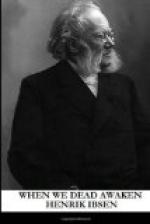IRENE.
[Hides the knife.] I will listen as quietly as a mother can when she—–
PROFESSOR RUBEK.
[Interrupting.] And you must not look at me while I am telling you.
IRENE.
[Moves to a stone behind his back.] I will sit here, behind you.— Now tell me.
PROFESSOR RUBEK.
[Takes his hands from before his eyes and gazes straight in front of him. When I had found you, I knew at once how I should make use of you for my life-work.
IRENE.
“The Resurrection Day” you called your life-work.—I call it “our child.”
PROFESSOR RUBEK.
I was young then—with no knowledge of life. The Resurrection, I thought, would be most beautifully and exquisitely figured as a young unsullied woman—with none of our earth-life’s experiences—awakening to light and glory without having to put away from her anything ugly and impure.
IRENE.
[Quickly.] Yes—and so I stand there now, in our work?
PROFESSOR RUBEK.
[Hesitating.] Not absolutely and entirely so, Irene.
IRENE.
[In rising excitement.] Not absolutely—? Do I not stand as I always stood for you?
PROFESSOR RUBEK.
[Without answering.] I learned worldly wisdom in the years that followed, Irene. “The Resurrection Day” became in my mind’s eye something more and something—something more complex. The little round plinth on which your figure stood erect and solitary—it no longer afforded room for all the imagery I now wanted to add—–
IRENE.
[Groped for her knife, but desists.] What imagery did you add then? Tell me!
PROFESSOR RUBEK.
I imagined that which I saw with my eyes around me in the world. I had to include it—I could not help it, Irene. I expanded the plinth —made it wide and spacious. And on it I placed a segment of the curving, bursting earth. And up from the fissures of the soil there now swarm men and women with dimly-suggested animal-faces. Women and men—as I knew them in real life.
IRENE.
[In breathless suspense.] But in the middle of the rout there stands the young woman radiant with the joy of light?—Do I not stand so, Arnold?




